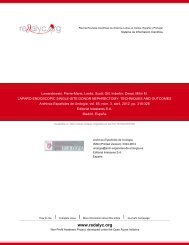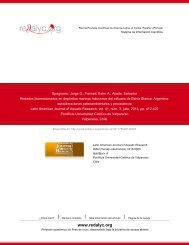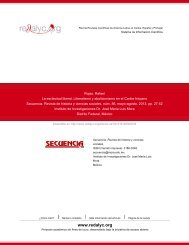Redalyc.Max Weber, as Múltiplas Modernidades e a Reorientação ...
Redalyc.Max Weber, as Múltiplas Modernidades e a Reorientação ...
Redalyc.Max Weber, as Múltiplas Modernidades e a Reorientação ...
You also want an ePaper? Increase the reach of your titles
YUMPU automatically turns print PDFs into web optimized ePapers that Google loves.
<strong>Max</strong> <strong>Weber</strong>, <strong>as</strong> Múltipl<strong>as</strong> <strong>Modernidades</strong> e a <strong>Reorientação</strong> da Teoria Sociológica<br />
JONES, Eric L. (1981), The European Miracle: Environments, Economics, and Geopolitics in<br />
the History of Europe and Asia. Cambridge, Cambridge University Press.<br />
. (1988), Growth Recurring. Economic Change in World History. Oxford, Clarendon<br />
Press.<br />
KALBERG, Stephen. (1994), <strong>Max</strong> <strong>Weber</strong>’s Comparative-Historical Sociology. Cambridge,<br />
Polity Press.<br />
KING, Gary, KEOHANE, Robert O. e VERBA, Sidney. (1994), Designing Social Inquiry.<br />
Scientific Inference in Qualitative Research. Princeton, Princeton University Press.<br />
KNÖBL, Wolfgang. (2006), “Verwerfungen in der kl<strong>as</strong>sischen Moderne – der<br />
US-amerikanische Süden als Problemfall in der Debatte um die ‘Multiple Modernities’”,<br />
in T. Schwinn (org.), Die Vielfalt und Einheit der Moderne. Opladen, Verlag für<br />
Sozialwissenschaften.<br />
LANDES, David. (1998), The Wealth and Poverty of Nations. Why Some Are so Rich and Some<br />
so Poor. New York, W.W. Norton & Company.<br />
LIEBERSON, Stanley. (1991), “Small N's and Big Conclusions: An Examination of the<br />
Re<strong>as</strong>oning in Comparative Studies B<strong>as</strong>ed on a Small Number of C<strong>as</strong>es”. Social Forces,<br />
vol. 70, n o 1, pp. 307-320.<br />
LIJPHART, Arend. (1971), “Comparative Politics and the Comparative Method”. The<br />
American Political Science Review, vol. LXV, pp. 682-693.<br />
MAGUBANE, Zine. (2005), “Overlapping Territories and Intertwined Histories: Historical<br />
Sociology's Global Imagination”, in J. Adams, E. S. Clemens e A. S. Orloff<br />
(orgs.), Remaking Modernity. Politics, History, and Sociology. Durham/London, Duke<br />
University Press, pp. 92-108.<br />
MAHONEY, James. (2003), “Long-Run Development and the Legacy of Colonialism in<br />
Spanish America”. American Journal of Sociology, vol. 109, n o 1, pp. 50-106.<br />
MELLEUISH, Gregory. (2004), “The Cl<strong>as</strong>h of Civilizations. A Model of Historical Development?”,<br />
in S. A. Arjomand e E. A. Tiryakian (orgs.), Rethinking Civilizational Analysis.<br />
London, Sage, pp. 234-244.<br />
MITTERAUER, Michael. (2003), Warum Europa? Mittelalterliche Grundlagen eines Sonderwegs.<br />
Munich, C.H. Beck Verlag.<br />
OSTERHAMMEL, Jürgen. (1998), Die Entzauberung Asiens. Europa und die <strong>as</strong>iatischen Reiche<br />
im 18. Jahrhundert. Munich, C.H. Beck Verlag.<br />
. (2000), Sklaverei und die Zivilisation des Westens. Munich, Carl Friedrich von Siemens<br />
Stiftung.<br />
. (2001), “Transnationale Gesellschaftsgeschichte: Erweiterung oder Alternative”.<br />
Geschichte und Gesellschaft, vol. 27, n o 3, pp. 464-479.<br />
POMERANZ, Kenneth. (2000), The Great Divergence. China, Europe and the Making of the<br />
Modern World Economy. Princeton, Princeton University Press.<br />
SZÜCS, Jenö. (1988), “Three Historical Regions of Europe. An Outline”, in J. Keane<br />
(org.), Civil Society and the State. New European Perspectives. London/New York, Verso,<br />
pp. 291-332.<br />
507<br />
Revista Dados – 2006 – Vol. 49 n o 3


















